Outlaws of Thunder Junction Mechanics
Howdy, stranger. Can't say I've seen you here before. Now that the Omenpaths have opened Thunder Junction to the Multiverse at large, things ain't as secretive as they used to be. Some may be frazzled at sudden company, but not me. Every new acquaintance is a new opportunity. But opportunities are just regrets without preparation.
So, let's get you prepared for Thunder Junction. New cards, new abilities, and plenty of loot are looking for a good home.
Set Contents


OTC Expansion Symbol
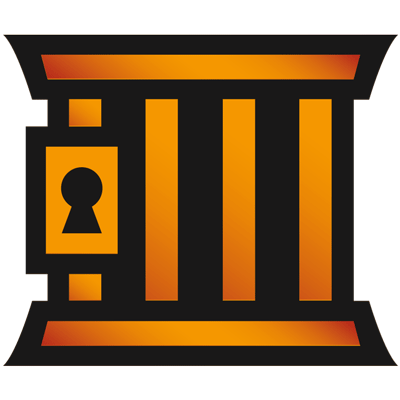
OTP Expansion Symbol
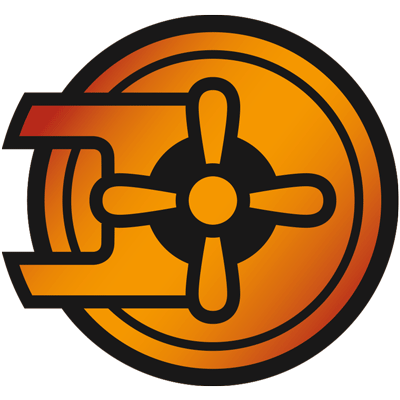
BIG Expansion Symbol
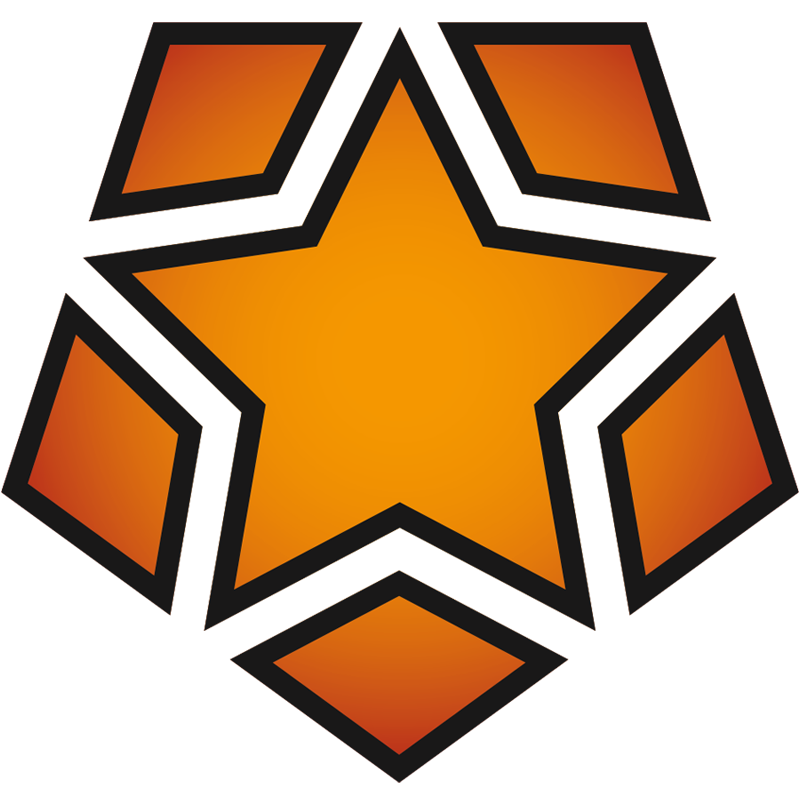
SPG Expansion Symbol
Before we dive into the new mechanics, let's talk Limited. As is usually the case, any card you open in Sealed Deck and Draft events is part of your card pool and can be played. It doesn't matter if it's OTJ, BIG, OTP, SPG, or OTC. It belongs to you, and it's yours to include in your deck if you want. What do those expansion codes mean? I'm glad you asked.
The Outlaws of Thunder Junction release contains a tumblewagg's bounty worth of cards. Of course, there's the main set with expansion code OTJ. There's also a separate subset called The Big Score, giving you a peek at what everyone's scheming after. These 30 cards have expansion code BIG. OTJ and BIG cards are legal for Standard play, as well as most other Constructed formats, including Commander.
But wait! There's more. You may open cards from a 65-card bonus sheet called Breaking News. These newspaper-inspired reprints are all potential crimes (we'll get to that in a minute) and have the expansion code OTP.
Or, you may be visited by one of the Special Guests cards. These 10 reprints have the expansion code SPG. OTP and SPG cards are legal in Commander, Legacy, and Vintage. Individual cards from these sets will continue to be legal in any format in which they are already legal.
To round out the gang, new Commander cards with expansion code OTC can be found in some Collector Boosters as well as the Commander decks. Reprints with expansion code OTC complete those Commander decks. Those cards are legal in Commander, naturally, as well as Legacy and Vintage. Any reprint is legal in any format in which it was already legal.
Outlaws
Success on this plane, and on other planes I suppose, often boils down to the company you keep. Several cards in the set refer to outlaws.
An outlaw, used as a noun, is any permanent with one or more of these creature types: Assassin, Mercenary, Pirate, Rogue, and Warlock. You'll often see abilities such as the one Rakish Crew has that refer to "an outlaw you control." This phrase refers only to permanents on the battlefield, not spells or cards anywhere else. Outlaws are almost always creatures, but a kindred permanent (a little-seen card type previously known as tribal) with one or more of the right creature types can also be an outlaw. Go figure.
Outlaw can also be used as an adjective to describe something else, such as a spell or a card in a zone other than the battlefield. For example, an ability may trigger whenever you cast an outlaw spell or return an outlaw creature card from your graveyard to the battlefield.
Committing a Crime
Success on this plane, and on other planes I suppose, often boils down to how far you're willing to go to get what you want. The new rules term committing a crime covers a range of common actions you'll probably be happy to take during your games. Several cards in the set will even reward you for doing so.
You commit a crime as you cast a spell, activate an ability, or put a triggered ability on the stack that targets one or more of the following:
- An opponent
- A spell or ability an opponent controls
- A permanent an opponent controls
- A card in an opponent's graveyard
If a spell or ability doesn't target anything on that list, it's not a crime, even if it targets something like an opponent's card in exile or has a sinister-sounding name that would be a felony in many jurisdictions.
Once you cast the spell, activate the ability, or put the triggered ability on the stack, the crime has been committed. It doesn't matter what happens to the spell or ability (or any of its targets) after that point.
Spree
Success on this plane, and on other planes I suppose, often boils down to not settling when you can have it all. Spree is a new keyword found on several modal cards in this set.
Each mode includes an additional cost that must be paid to cast the spell. You must choose one or more modes as you cast a spell with spree, but no single mode can be chosen more than once. If you cast a spell with spree without paying its mana cost, you must still choose one or more modes and pay those additional costs. The mana cost is covered though, so at least you enjoy a nice discount.
Spree cards have a modified frame that includes a plus sign by the mana cost—this is just a reminder and has no actual rules meaning. Remember that no matter which modes you choose and which additional costs you pay, the mana value of a spell with spree is based only on its mana cost. For example, Final Showdown's mana value is always 1, even if you chose all three modes.
Mounts and Saddle
Success on this plane, and on other planes I suppose, often boils down to not standing still for too long. Find yourself a trusty Mount and saddle up. Thunder Junction, let's ride!
Mount is a new creature type. It doesn't have any specific rules associated with it; it's just where you're most likely to find the new ability saddle. There's no real connection between Mounts and saddle other than a flavorful one. If a Mount becomes some other creature type, it will still have saddle, and non-Mounts can gain saddle if effects allow them to do so.
Saddle is an activated ability that you activate as a sorcery—meaning during your main phase while the stack is empty—by tapping any number of untapped creatures you control other than the Mount with saddle with total power N or more, where N is the number included in the saddle keyword.
As the saddle ability resolves, the Mount becomes saddled until end of turn. This doesn't inherently mean anything, but another ability on the card will somehow refer to the Mount being saddled. Many Mounts have simple triggered abilities like the one Trained Arynx has—these trigger whenever the Mount attacks while saddled. But some Mounts give you a little more bang for your bucking bronco. Our old friend The Gitrog doesn't treat its riders too kindly, but you'll be in prime position to benefit.
Plot
Success on this plane, and on other planes I suppose, often boils down to planning. Plot is a new keyword that allows you to pay a cost up front and exile a card from your hand. The card then becomes plotted. On a future turn, you may cast a plotted card from exile without paying its mana cost. Both the special action to plot the card from your hand and casting a plotted card from exile are done as a sorcery—again, meaning during your main phase while the stack is empty.
Plot is a fantastic way to set up future turns, knowing that your spell is available for no further mana investment. To take full advantage of Plan the Heist, you'd prefer to have an empty hand as it resolves. Or maybe you're still searching for a second source of blue mana. No matter your reasons, plotting the card sets you up for a potent turn in the future.
Some plot cards offer cheaper plot costs, letting you save on mana if you're willing to wait for a future turn to finally cast the spell. Some are creatures with triggered abilities that you may want to time more strategically. What's more, the plot keyword isn't the only way to have cards become plotted. Sometimes, you need to … well, this:
The same timing rules apply to any card that becomes plotted, no matter how that happens. It can't be cast on the same turn it became plotted. When you finally do cast the spell, you do so as a sorcery.
Bounties (Commander Minigame)
Success on this plane, and on other planes I suppose, often boils down to keeping your eyes on the prize. Bounty cards are a special addition to Commander decks that present players with some interesting characters to try and apprehend.
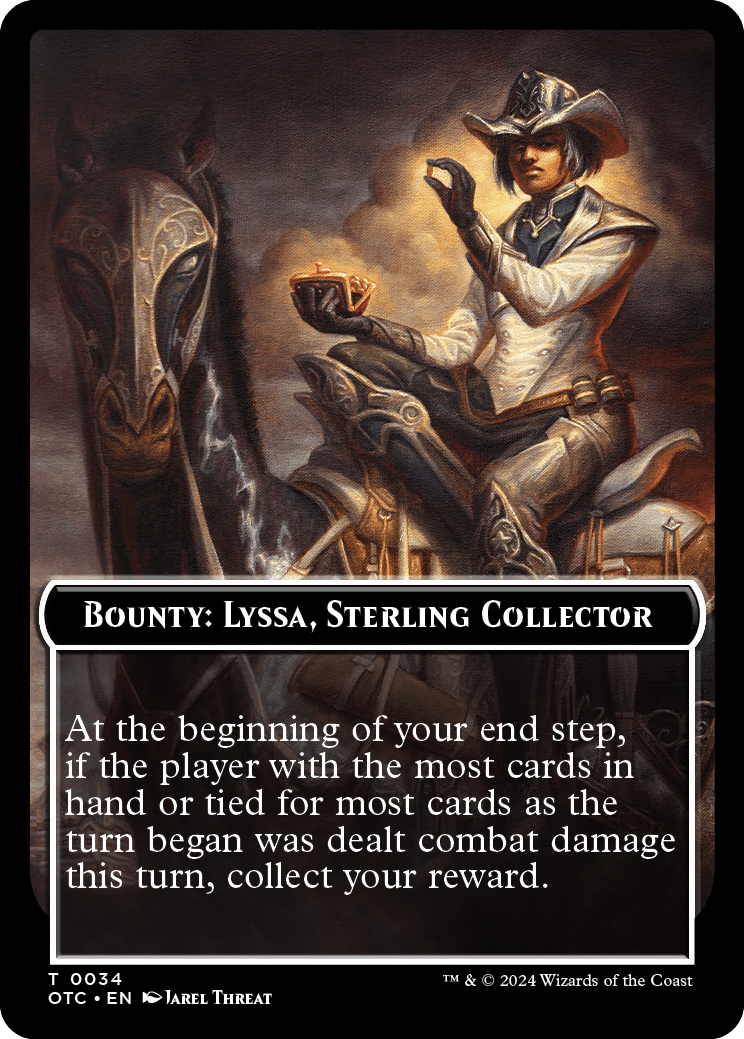
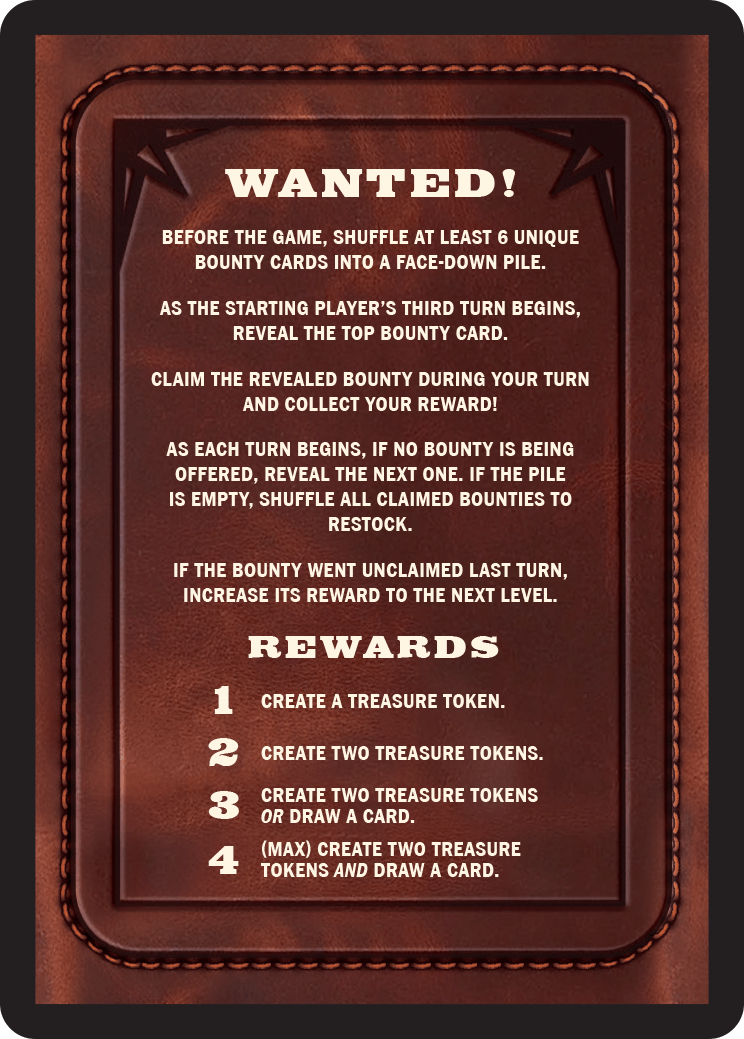
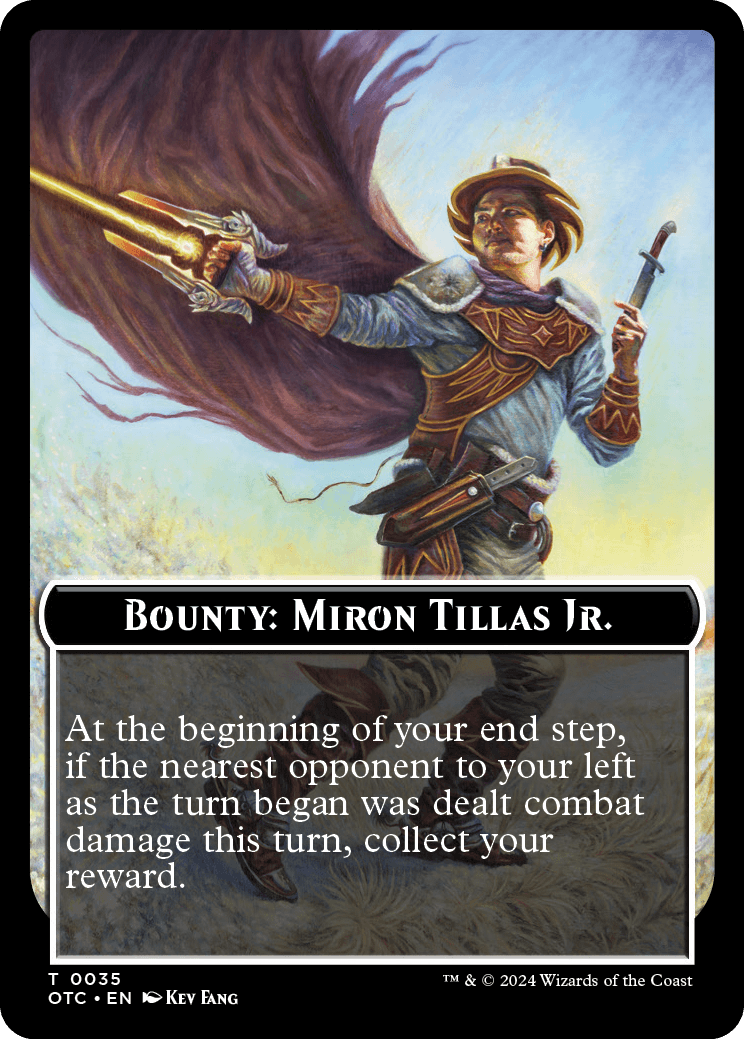

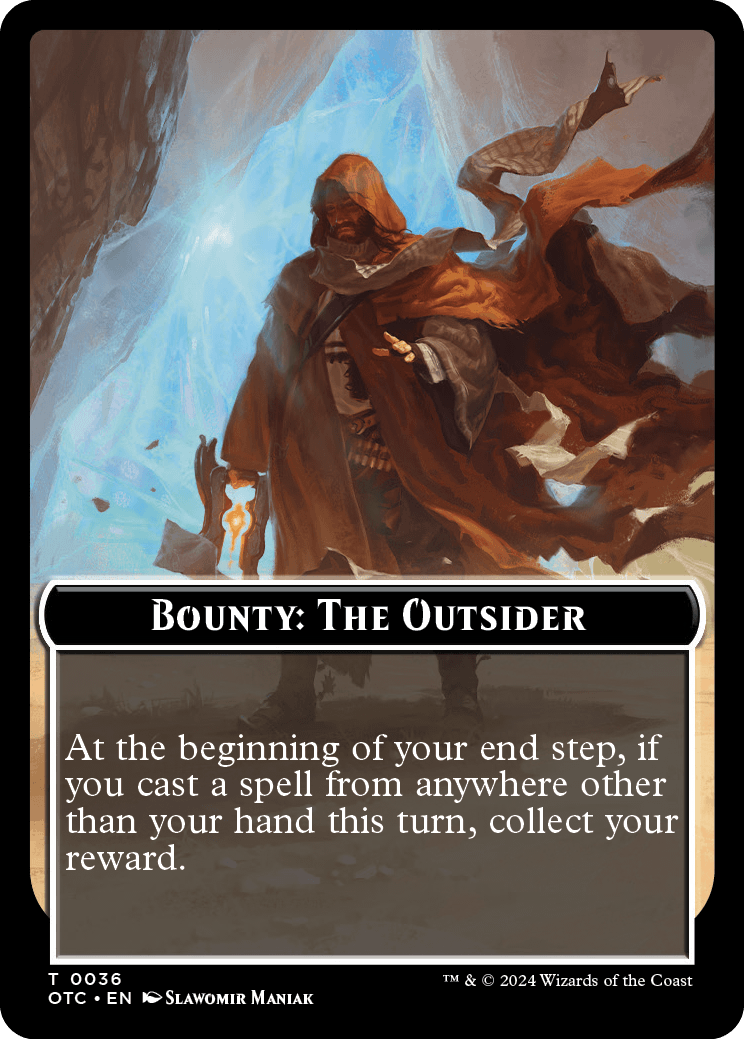

If your game includes bounties, all players use a shared bounty deck, which consists of at least 6 of the 12 total bounty cards. The bounty deck uses no more than one of any particular bounty card. After all, once they're caught, no sense in putting out another bounty on them, right? That's just throwing away good loot.
Bounties begin on the starting player's third turn. Gives the fugitives a sporting chance, you know? Each bounty card describes the condition under which a player may capture them and claim their reward. Only the player whose turn it is can claim a reward, and only one reward may be claimed per turn.
There are four different reward levels for bounties, and each bounty uses the same reward chart. If you claim a reward on the turn that bounty was first offered, you create a Treasure token—the level 1 reward. If a bounty goes unclaimed at the end of the turn, the reward level increases until the maximum reward is offered at level 4, two Treasure tokens and a card.
Once you claim a reward, set that bounty card aside. You can place it next to you for bragging rights. As the next turn begins, you'll reveal who's next to be on the run. If the bounty deck is depleted, there's been a jailbreak! Shuffle all the bounty cards back together to reform the bounty deck. You'll have to get to work catching everyone again. At least there's more Treasure and maybe some cards in it for you.
Preorder Outlaws of Thunder Junction at your local game store, online retailers like Amazon, and elsewhere Magic products are sold before the set's worldwide release April 19, 2024.

